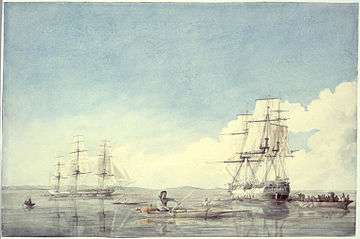Eddystone (1802 ship)
Eddystone (or Eddistone) was launched at Hull in 1802. She then sailed for the North West Company. The French Navy captured her in 1806 but an armed ship of the Royal Navy recaptured her within weeks. She next sailed for the Hudson's Bay Company (HBC) from 1807 to about 1824. She then traded generally until May 1843 when she was wrecked.
 The Hudson's Bay Company ships Prince of Wales and Eddystone bartering with the Inuit off the Upper Savage Islands, Hudson Strait; by Robert Hood (1819) | |
| History | |
|---|---|
| Name: | Eddystone |
| Namesake: | Eddystone Rocks |
| Builder: | Hull |
| Launched: | 1802 |
| Fate: | Wrecked 19 May 1843 |
| General characteristics | |
| Tons burthen: | 245[1][2] (bm) |
| Complement: | 28[2] |
| Armament: | 2 × 6-pounder guns + 12 × 9-pounder carronades[2] |
Career
Eddystone first appeared in Lloyd's Register (LR) in 1802 with Featherstone, master and owner, and trade Hull–Baltic.[1]

In 1803 John Fraser, one of the founders of the North West Company, purchased her. At the time, the North West company was challenging the HBC's monopoly on the fur trade at Hudson's Bay. The North West Company sent an overland expedition to the southern end of the bay, and sent Eddyston to meet it there. The Company then established a post on Charlton Island, on James Bay.[3]
| Year | Master | Owner | Trade | Source |
|---|---|---|---|---|
| 1803 | Featherstone Richards |
Feaherstone Fraser & Co. |
Hull–Baltic | LR |
| 1805 | Richard Sarman |
Fraser & Co. | Hull–Baltic London–Quebec |
LR |
The French frigates Sirène and Revanche captured Eddystone, Sarman, master, on 13 September 1806 as she was sailing from Quebec to London. The French took out her captain, crew, and furs, which were the most valuable part of her cargo. Colpoys recaptured Eddystone off Cape Finisterre and sent her into Plymouth, where she arrived in early October.[4][5]
By 1807 the North West Company had given up its operations at Charlton Island. The problem was not the HBC's opposition but rather was one of lack of trade.[3] In 1807 the HBC purchased Eddystone and appointed Captain Thomas Ramsey as her master. Thereafter, Eddystone and Prince of Wales were the main vessels supplying the HBC's posts in Hudson Bay.[6][Note 1] Captain Thomas Ramsey acquired a letter of marque on 2 May 1808.[2]
| Year | Master | Owner | Trade | Sources & notes |
|---|---|---|---|---|
| 1807 | Sarman Ramsey |
Fraser & Co. Hudson's Bay Company |
London–Quebec | LR |
| 1810 | Ramsey | Hudson's Bay Company | London–Hudson Bay | LR |
| 1815 | J.Turner | Hudson's Bay Company | London–Hudson Bay | LR |
In 1811 and 1813 Eddystone and Prince of Wales carried settlers to Hudson Bay. In 1815, Eddystone became trapped in the lower part of Hudson Bay and had to overwinter there.[8]
On 21 October 1817, Eddystone, Davis, master, came upon the waterlogged and abandoned Rover, of Newcastle, at 59°30′N 17°30′E. Eddystone could not approach because of the state of the sea. Eddystone was carrying a cargo of timber and furs.[9]

| Year | Master | Owner | Trade | Source & notes |
|---|---|---|---|---|
| 1820 | Bell | Hudson's Bay Company | London–Hudson's Bay | LR |
| 1824 | Bell J.Dale |
Hudson's Bay Company | London–Hudson's Bay | LR |
| 1825 | J.Dale | T.Benson | Dartmouth | LR; small repairs 1824 |
| 1830 | H.Harrison | T.Benson | Cowes–Southampton | LR; small repairs 1825 and 1827 |
| 1835 | J.Kearsley | T.Benson | "Stk." | LR; small repairs 1833 & large repairs 1835 |
| 1840 | J.Kearsley Macintosh |
T.Benson | Plymouth–America | LR; large repairs 1835 & 1836, small repairs 1838, & damages repaired 1839 |
In June 1836 Eddystone, Kearsley, master, grounded in the river at Newport, Wales, at the outset of a voyage to Savannah. It appeared her bottom might have been broken and she had to discharge and effect repairs.[10]
Fate
Eddystone was wrecked on 19 May 1843. She was driven ashore and wrecked at Point May, Newfoundland. Her crew were rescued. She was on a voyage from Liverpool, Lancashire to Quebec City.[11] Her entry in Lloyd's Register for 1843 carried the annotation "LOST".[12]
Notees, citations, and references
Notes
- Log books exist for Eddystone for the period 1807 to 1823.[7]
Citations
- LR (1802), Supple.pages "E", Seq.№E103.
- "Letter of Marque, p.60 - accessed 25 July 2017" (PDF). Archived from the original (PDF) on 20 October 2016. Retrieved 27 October 2018.
- Cooper (1988), p. 185.
- "No. 15993". The London Gazette. 20 January 1807. p. 80.
- Lloyd's List 3 October 180r, №4087.
- Houston (1994), p. 5, fn.1.
- Section C: Ships' Records Finding Aid.
- Houston (1994), p. 5.
- "Ship News", Times (London, England), 6 November 1817; pg. 2; Issue 10296.
- "Ship News", Times (London, England), 21 June 1836; pg. 7; Issue 16135.
- "Ship News". The Times (18338). London. 3 July 1843. col C-D, p. 2.
- LR (1843), Seq.№E119.
References
- Cooper, Barry (1988). Alexander Kennedy Isbister: A Respectable Critic of the Honourable Company. McGill-Queen's Press. ISBN 9780773573529.
- Houston, Stuart (1994). To the Arctic by Canoe 1819-1821: The Journal and Paintings of Robert Hood, Midshipman with Franklin. McGill-Queen's Press. ISBN 9780773512221.